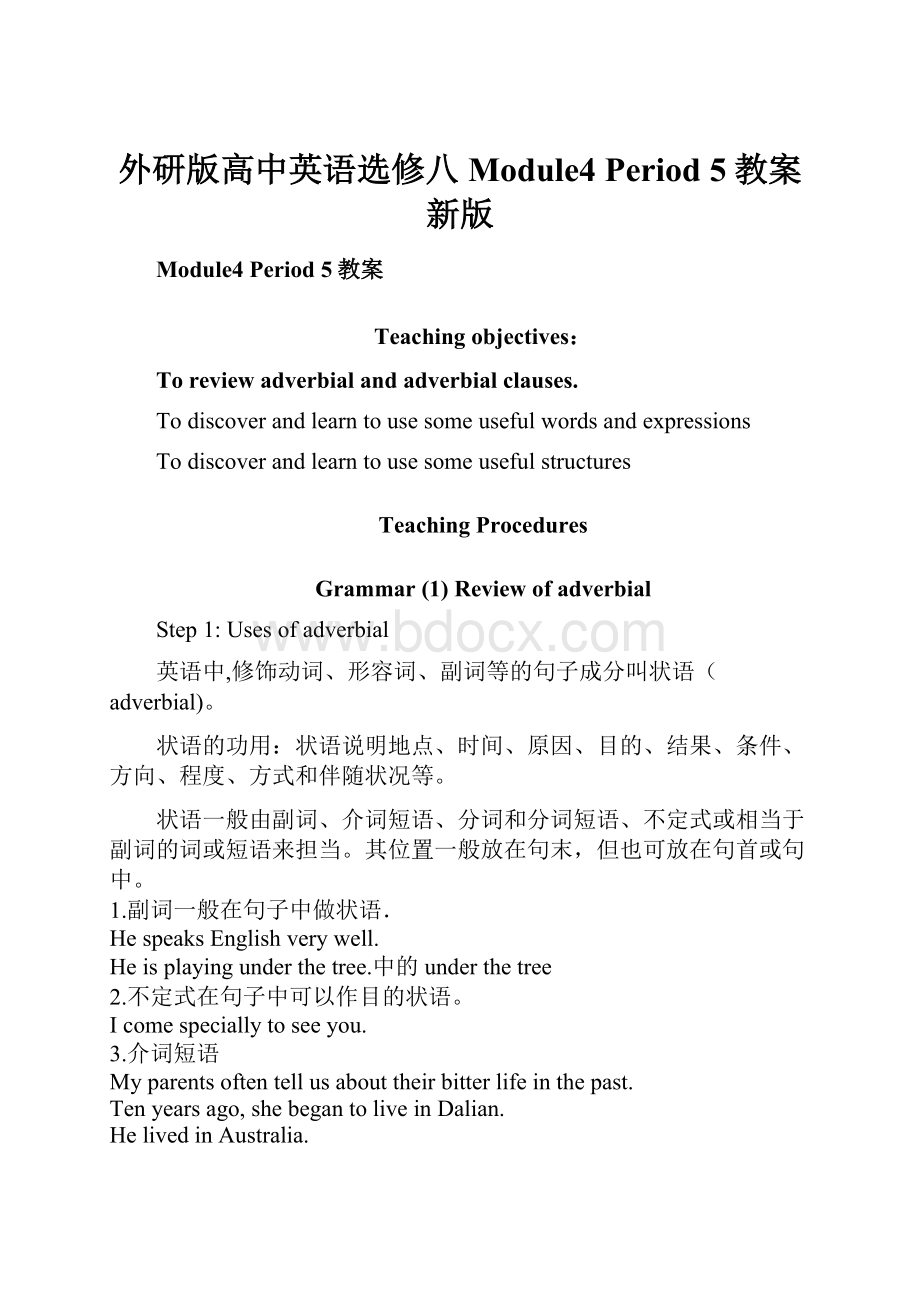外研版高中英语选修八 Module4 Period 5教案新版.docx
《外研版高中英语选修八 Module4 Period 5教案新版.docx》由会员分享,可在线阅读,更多相关《外研版高中英语选修八 Module4 Period 5教案新版.docx(14页珍藏版)》请在冰豆网上搜索。

外研版高中英语选修八Module4Period5教案新版
Module4Period5教案
Teachingobjectives:
Toreviewadverbialandadverbialclauses.
Todiscoverandlearntousesomeusefulwordsandexpressions
Todiscoverandlearntousesomeusefulstructures
TeachingProcedures
Grammar
(1)Reviewofadverbial
Step1:
Usesofadverbial
英语中,修饰动词、形容词、副词等的句子成分叫状语(adverbial)。
状语的功用:
状语说明地点、时间、原因、目的、结果、条件、方向、程度、方式和伴随状况等。
状语一般由副词、介词短语、分词和分词短语、不定式或相当于副词的词或短语来担当。
其位置一般放在句末,但也可放在句首或句中。
1.副词一般在句子中做状语.
HespeaksEnglishverywell.
Heisplayingunderthetree.中的underthetree
2.不定式在句子中可以作目的状语。
Icomespeciallytoseeyou.
3.介词短语
Myparentsoftentellusabouttheirbitterlifeinthepast.
Tenyearsago,shebegantoliveinDalian.
HelivedinAustralia.
Theboywaspraisedforhisbravery.
4.从句作状语
Whenshewas12yearsold,shebegantoliveinDalian.
Youwon’tpasstheexamunlessyoustudyhard.
IfIamnotbusytomorrow,Iwillplayfootballwithyou.
5.分词作状语
Havinghadaquarrelwithhiswife,helefthomeinabadtemper.
Inhibitedinonedirection,itnowseemsthattheMississippiisabouttotakeanother.
Step2:
Exercisesonthestudents’books
1.Activity1
Forreference
a:
1,3,5,7;b:
2,6;c:
7;d:
4;e:
8.
2.Activity2
Forreference
1.resultadverbial2.manneradverbial3.degreeadverbial4.placeadverbial.
5.causeadverbial6.timeadverbial7.frequencyadverbial
3.Activity3
Forreference
1.today2.anareaofcentralEngland3.very4.betweennorthandsouth5.oftheregion
6.Duringthe13thand14thcenturies7.becauseofthenewopportunitiesthecityoffered
8.often.
Grammar
(2)Reviewofadverbialclause
Step1:
Usesofadverbialclause
状语从句在主从复合句中修饰主句的动词、形容词或副词等,按意义分为时间、地点、原因、目的、结果、条件、让步、方式、比较等状语从句。
1.时间状语从句
引导时间状语从句的从属连词有after,as,before,once,since,till,until,when,whenever,while,assoonas,nosooner…than…,hardly…when…,scarcely…when…等,以及名词短语themoment,theinstant,everytime等。
如:
Isawhimwhen/whilehewasgoingoutoftheroom.在他走出房间时我碰见了他。
Edison’smotherhadbeenateacherbeforeshegotmarried.爱迪生的妈妈结婚前是位老师。
Onceyougetusedtoit,you’lllikeit.你一旦习惯了它,就会喜欢上它。
IrecognizedyouthemomentIsawyou.我一看见你就认出了你。
注意:
nosooner…than…,hardly…when…,scarcely…when…这三个结构意为“一…就…”,相当于assoonas,均可引导时间状语从句,但只能用于过去时,即主谓语用过去完成时,从句用一般过去时。
Nosooner,hardly,scarcely置于句首时,主句要部分倒装。
如:
我一到家,天就下起雨来了。
可译为:
AssoonasIcamehome,itbegantorain.
Ihadnosoonercomehomethanitbegantorain.
Ihadhardly/scarcelycomehomewhenitbegantorain.
NosoonerhadIcomehomethanitbegantorain.
Hardly/scarcelyhadIcomehomewhenitbegantorain.
2.地点状语从句
地点状语从句通常由where,wherever等引导。
如:
Helivedwhereheliked.他住在他喜欢的地方。
Wherethereisawill,thereisaway.有志者,事竟成。
(谚语)
Wherevertheywent,theywerewarmlywelcomed.他们所到之处都受到热烈欢迎。
3.原因状语从句
原因状语从句通常由because,since,as,nowthat等引导。
如:
Hedidn’tattendthemeetingbecausehehadtoomuchworktodo.
他因为要干的活太多没来参加会议。
Sincehecan’tanswerthequestion,you’dbetterasksomeoneelse.
既然他回答不了这个问题,你最好问别人吧。
AsIhaven’tseenthefilm,Ican’ttellyouwhatIthinkofit.
由于我没看过这部电影,所以谈不出对它有什么看法。
Nowthatyouhavecome,youmaystay.你既然来了,就留下吧。
注意:
for也可表“原因”,语气较弱,有时可与because换用,但它是并列连词,它连接的句子并不总是原因,有时可能对前面的分句提出推断的理由,不能回答why引导的疑问句,它连接的分句只能后置,且前面有逗号。
Thegroundiswet,foritrainedlastnight.
地面很湿,因为昨天晚上下雨了。
(表原因,可用because代替)
Itrainedlastnight,forthegroundiswet.
昨天晚上下雨了,因为地面很湿。
(提出判断的理由,“地湿”不是“下雨”的原因,不可用because代替)
4.目的状语从句
目的状语从句常由sothat,inorderthat,so,that,incase(以防、以免),lest(以防),forfearthat(以防、以免)等引导。
如:
Iamsavingmoneyinorderthat/sothatIcanbuyahouse.我正在攒钱,以便买一所房子。
Inorderthatthereshouldbenomisunderstanding,weproposetoholdameeting.
为了不出现误解,我们建议开一个会。
Bringitcloserso/that/sothatImayseeitbetter.把它拿近点,我好看清些。
Shutthewindowforfear(that)itshouldrain.关上窗户,以防下雨。
I’llexplainittohimlesthe(should)doubtme.
我向他解释了这件事,以免他怀疑我。
Takeyourraincoatincaseitrains/(should)rain.带上雨衣以防下雨。
注意:
1)sothat,inorderthat,sothat引导的目的状语从句常含情态动词can,could,may,might,will,would,should等。
如:
Hegotupearlysothathecouldcatchtheearlybus.他早早起床,以便能赶上早班车。
2)lestforfearthatincase“should+动词原形”型虚拟语气。
should可省略。
如:
Shutthewindowforfear(that)itshouldrain.关上窗户,以防下雨。
I’llexplainittohimlesthe(should)doubtme.我向他解释了这件事,以免他怀疑我。
Takeyourraincoatincaseitrains/(should)rain.带上雨衣以防下雨。
5.结果状语从句
结果状语从句常由so…that…,such…that…,sothat,that等引导。
如:
Thequestionisofgreatimportancethatitcan’tbeneglected.这个问题很重要,不能忽视。
Itwasverycold,sothattheriverfroze.天很冷,河水结冰了。
Hewassobrilliantthathemadealotofinventions.他很有才华,搞了许多发明。
Heshowedsuchgreatcouragethateverybodyrespectedhim.
他表现出那么大的勇气,大家都尊敬他。
比较:
Hegotupearlysothathecaughttheearlybus.
他早早就起床,结果赶上了早班车。
Hegotupearlysothathecouldcatchtheearlybus.
他早早起床,以便能赶上早班车。
6.条件状语从句
条件状语从句常由if,unless,as/solongas(只要),incase(如果,万一),suppose/supposing(that)(假如,倘若),oncondition(that)(如果,只要)等引导。
如;
IfImakeapromise,I’llkeepit.如果我许下诺言,我就遵守。
I’lllendyouthemoney,as/solongasyoutakemyadvice.
只要你接受我的劝告,我就借钱给你。
I’llcomeoncondition(that)Maryisinvited,too.假如也邀请玛丽,我就来。
Suppose/Supposing(that)allthedoorsarelocked,howwillyougetintothehouse?
假如所有的门都锁上了,你怎么进这所房子?
IncaseIforget,pleaseremindmeofit.一旦我忘了,请提醒我这件事。
注意:
条件状语从句中常用一般现在时代替一般将来时,用一般过去时代替过去将来时。
如:
Ifitrainstomorrow,thesportsmeetwon’ttakeplace.如果明天下雨,运动会将不举行。
Hesaidhewouldn’tcomeunlesshewasinvited.他说如果不被邀请,他不来。
7.让步状语从句
让步状语从句常由although,though,as,evenif,eventhough,whoever,whatever,whenever,however,wherever,nomatterwho(what,when,where,how),whether等引导。
如:
Although/ThoughhewasaSpanish,hespentmostofhislifeinGermany.
他虽然是西班牙人,但他的大半生是在德国度过的。
Evenif/thoughyoudon’tlikemusic,youmusthaveheardofhim.
即使你不喜欢音乐,你也一定听说过他。
I’lldoitwhetheryoulikeitornot.不论你是否喜欢,我都要做。
Whatever/Nomatterwhathappens,youmustbecalm.不论发生什么情况,你必须镇静。
I’llfindthepersonwhodidit,whoever/nomatterwhoheis.
我要找到干这事的人,不论他是谁。
I’lldiscussitwithyouwhenever/nomatterwhenyouliketocome.
你什么时候喜欢来,我都愿意和你讨论这个问题。
Wherever/Nomatterwhereheis,hewillbethinkingofyou.
不论在哪里,他都会想到你。
注意:
Although,though,as三者均可引导让步状语从句,意为“虽然”,“尽管”。
although和though引导的让步状语从句放在主句前后均可,as引导的让步状语从句一般放在句首;although引导的让步状语从句不倒装,though引导的可倒可不倒,as引导的必须倒装,且如果从句中单数名词或形容词最高级作表语,倒装时不再用冠词;although和though引导的让步状语从句可用虚拟语气,as而则不可。
如:
HeoftenhelpsmewithmyEnglishalthough/thoughheisquitebusy.
尽管他相当忙,但还常常帮我学英语。
Tom,though(hewas)young,diditverywell.汤姆虽然很年轻,但事情做得很出色。
Althoughheisyoung,yetheisfitforthejob.
Thoughheisyoung,yetheisfitforthejob.
Youngthoughheis,yetheisfitforthejob.
Youngasheis,yetheisfitforthejob.
以上四句意思均为:
尽管他很年轻,可他还胜任这项工作。
Youngestasheisinourclass,hespeaksEnglishthebest.
虽然他是我们班年龄最小的,但英语说的最好。
Childasheis,heknowsalot.尽管他是个孩子,但懂得不少事情。
Hewillneverdosuchathingthough/althoughhe(should)beforcedto.
即使强迫他,他也决不会干这样的事。
(虚拟语气)
8.方式状语从句
方式状语从句常由as(象、如、照)和asif/though(好象、似乎)等引导。
如:
Yououghttodoasyourteachertellsyou.你应按老师说的去做。
Ihavechangedtheplanasyousuggested.我已根据你的建议改变了这个计划。
Hetalksasif/thoughheknowsallaboutit.他谈起来似乎对此了如指掌。
注意:
asif和asthough的意义和用法基本相同,它们引导的从句多用虚拟语气,也可用陈述语气。
如:
Hewakedasif/asthoughhewere(was)drunk.他走起来好像喝醉了。
Hisfatherlovesmeasif/asthoughIwerehisson.他父亲很喜欢我,好像我是他的儿子。
9.比较状语从句
比较状语从句常由as…as…,notas/so…as…,than等引导。
如:
SheisastallasTom.她与汤姆一样高。
Sheisnotas/sotallasTom.她不如汤姆高。
Hedoesn’tgetupas/soearlyashisbrother.他起床不如他兄弟早。
TomwaslessoldthanMary.汤姆没有玛丽大。
Noonecanbemorefitforhisofficethanheis.没人比他更称职。
Step2:
Exercisesonthestudents’books.
1.Activity1
Forreference
1.when2.as…as3.as4.aslongas5.so…that
2.Activity2
Forreference
a
(2),b
(1),c(3),d(5),e(4).
3.Activity3
Forreference
1(a),2(b),3(a),4(b),5(b),6(a),7(c).
Step3:
巩固练习
1.Ifweworkwithastrongwill,wecanovercomeanydifficulty,____greatitis.
A.whatB.howC.howeverD.whatever
2.Afterthewar,anewschoolbuildingwasputup____therehadoncebeenatheatre.
A.thatB.whereC.thatD.when
3.Whyareyouwantanewjob_____you’vegotsuchagoodonealready/
A.thatB.whereC.whichD.when
4._____you’vegotachance,youmightaswellmakefulluseofit.
A.NowthatB.AfterC.AlthoughD.Assoonas
5.Youshouldmakeitaruletoleavethings____youcanfindthemagain.
A.whenB.whereC.thenD.there
6.TheWTOcan’tliveuptoitsname_____itdoesnotincludeacountrythatishomegoonefifthofmankind.
A.aslongasB.whileC.ifD.eventhough
7._____Ihaveneverseenanyonewho’scapableasJohn.
A.AslongasIhavetraveledB.NowthatIhavetraveled
C.MuchasIhavetraveledD.AsIhavetraveledsomuch.
8.–DidyouremembertogiveMarythemoneyyouowedher?
–Yes,Igaveittoher_______Isawher.
A.whileB.themomentC.suddenlyD.once
9.Themenwillhavetowaitallday_____thedoctorworksfaster.
A.ifB.unlessC.whetherD.that
10.IalwaystakesomethingtoreadwhenIgotothedoctor’s______Ihavetowait.
A.incaseB.sothatC.inorderD.asif
11.Thescientist_______thelabuntilhefinisheddoingtheexperiment.
A.leftB.didn’tstoptoworkinC.stoppedworkinginD.didn’tleave
12.Iwasreadingadetectivestoryattentively______therecameasharpscream.
A.asB.whileC.whenD.since
13._____hebrokethelaw,hehadtobepunishedforhiscrime.
A.BecauseB.SinceC.AsD.For
14.WeLeaguemembersarereadytogo________wearemostneeded.
A.thereB.whenC